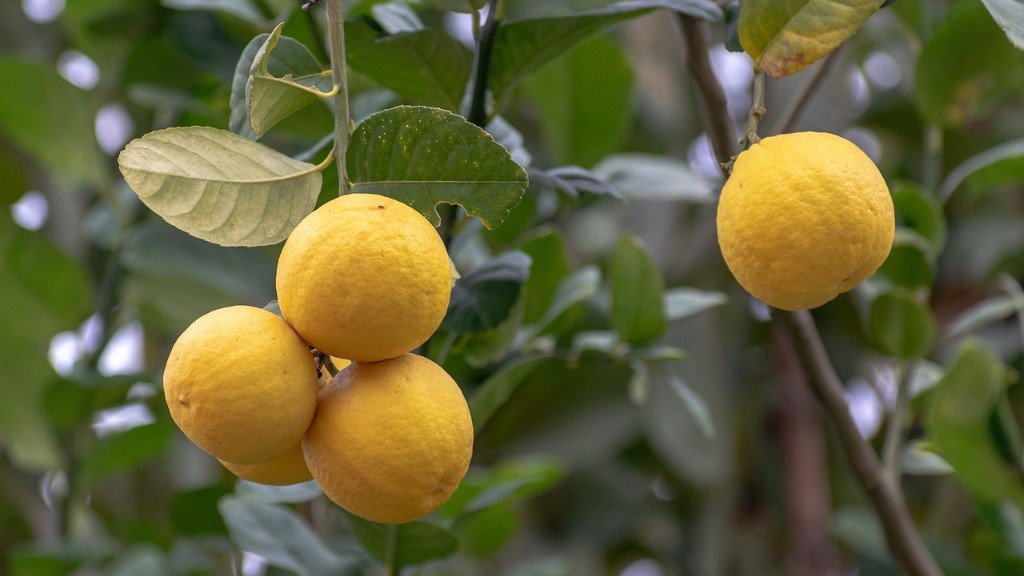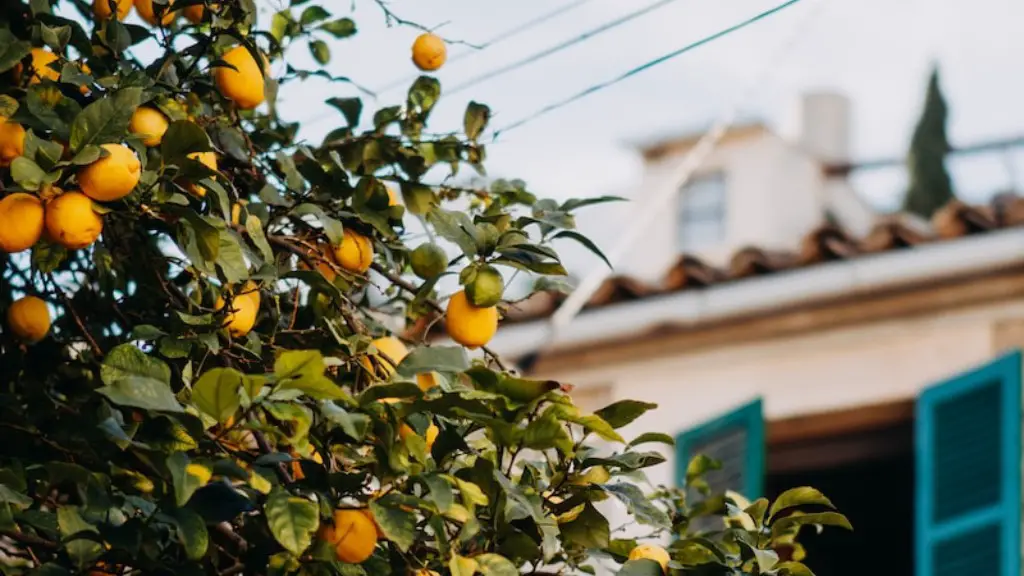Lemon trees are an essential element of gardens, terraces and balconies, as well as a great addition to any kitchen. Most people believe that lemon trees must be grown from cuttings, and while it is true that lemon trees are often propagated in this way, they can also be grown from seeds. But can you use lemon seeds to grow a healthy and fruitful lemon tree? The answer is yes, but there are a few steps you must follow and some facts to consider before planting a lemon tree grown from seeds.
To begin with, only use organic lemons when attempting to grow a tree. As much as it is tempting to use those perfect and shiny ones, they have been treated with substances or wax to make them look so. When choosing a lemon for its seeds, check for any damage or visible signs of mold on the peel. Organic lemons are usually slightly rough, have some spots, and are not perfectly round.
After selecting the lemon, cut it in half and carefully remove the seeds. Place the seeds in a bowl and make sure that none of them are attached to any pulp or segment. Rinse them off with water and let them dry thoroughly because moisture can cause molding. As lemon tree seeds tend to lose their germinating power very quickly, it is recommended to sow them immediately. To help increase chances of germination, soak the seeds in water for two days before sowing.
Once the seeds are prepped, you can easily start growing your lemon tree by sowing them in one or two cups. Place the cups in an area which receives plenty of light but always avoid direct sunlight. Use a soil mixture composed of organic soil, sand, and perlite, adding organic fertilizer if necessary. Plant the seeds about half an inch deep, keeping the soil damp but not soaking like a marsh. Depending on the species of lemon, it can take from two to four weeks for the seedlings to sprout.
It’s important to note that lemon trees grown from seeds tend to be more sensitive to cold temperatures, so make sure to bring them in if temperatures drop below the suggested range. The worst thing you can do is to water the seedlings too much. Overwatering will cause root rot and can lead to the death of the seedlings. Underwatering is not a good idea either — they need to be watered regularly, once a week, and checked to make sure the soil is moist but not too wet.
If your seedlings don’t sprout in the first try, don’t give up. You can always go back and select another lemon and try again. With patience, proper care and lots of sunlight, you can soon have a healthy and fruitful lemon tree.
What to Consider When Raising a Lemon Tree from Seed
When raising a lemon tree from seed, it is important to have some knowledge and be aware of certain factors to ensure the successful growth of the lemon tree. Firstly, identify the species of lemon being grown, and research the optimal growing conditions for it. Lemon trees need full sun and well-drained soil. The smaller varieties of lemons, such as ‘Meyer’ and ‘Lisbon’, are a bit more tolerant in the face of harsher temperatures, while the bigger varieties, such as ‘Eureka’ and ‘Lemonade’, may tend to suffer a bit more. With this knowledge, it is easier to identify the amount of water, fertilizer and protection needed, as well as the ideal soil type.
When prepping the lemon seeds, it is important to remove any pulp or segment that may be attached to the seeds, as they contain substances which change the germinating power of the seeds. Also, soaking them in water for two days before sowing helps the seeds to germinate. Before sowing, identify an area in the house which receives plenty of light but no direct sun, and make sure to have a suitable soil mixture with some organic fertilizer
Once the seeds have been planted, keep in mind that lemon tree seedlings are quite sensitive to drastic changes in temperature and moisture. Overwatering can cause root rot and lead to the death of the seedlings. Proper watering of the seedlings is also essential for their growth, about once a week or when the soil begins to dry out. Last but not least, isolate the seedlings until they are strong and resistant enough to be outside.
Transplanting a Lemon Tree Grown from Seed
Once the seedlings have sprouted, transplanting them to a more suitable location is the next logical step in the journey to raise a lemon tree from seed. To do it, first identify a spot in the garden or on the balcony or terrace which meets the necessary growing conditions: full sun, well-drained soil, and optimal temperature. After deciding on the location, prepare the new pot or soil plot by mixing in some compost or manure with the soil for good nutrition.
Carefully remove the seedlings from the cups, taking care to avoid damaging their fragile roots. Place the seedlings in their new home, taking care that the root balls do not become tangled as this will cause them damage. Gently fill in the mixed soil, patting it to create a slightly mounded shape around theseedling. Keep in mind that lemon trees need more water than other plants, so it is important to monitor the soil moisture level more closely.
Transplanting is a crucial step, and if done correctly it can result in a healthier and more fruitful lemon tree. When transplanting, it is important to make sure that the soil remains moist until the roots become established in their new home, but not to water them too much. You should also maintain the same temperature and light conditions that the seedlings were used to, as drastic changes could affect the tree’s growth.
Fertilizing and Protecting a Lemon Tree Grown from Seed
Fertilizing and protecting a lemon tree grown from seed is essential to ensure its successful growth and maintain its health. Soil nutrition is essential for optimal growth, and lemons need more fertilizer than other plants. Organic fertilizer, such as compost and manure, are better for their growth, as chemical sources of plant nutrition can break down the plant’s natural defenses and make the tree susceptible to disease. Initially use small amounts, and increase the quantities depending on the lemon tree’s growth.
Also, lemon trees are susceptible to a variety of parasites and diseases, and pest control is essential to ensure their growth and resistance. Keep an eye out for signs of disease, such as faded leaves and fruits, discoloration, black spots, and other deformities as these can all be signs of infestation. If any symptoms are detected, treat the problem immediately with natural preventive measures such as insecticides or pruning.
Protection against cold temperatures is also necessary when raising lemon trees from seed, as the colder temperatures can easily damage the seedlings. Once the seedlings have been transplanted, create a little habitat around it that will help the tree get through chillier temperatures. Cover the soil with mulch, straw or other material that can retain the moisture and heat, and cover the tree with a tarp to protect it from cold winds.
Caring for a Mature Lemon Tree
Once a lemon tree has been successfully grown from seed and is mature enough, it is important to continue caring for it to ensure its health and longevity. Soil nutrition and pest control are still essential: lemon trees need regular fertilizer and careful monitoring to detect any pest problems early. Pruning must be done regularly, as it helps control the shape of the tree and keeps it healthy by removing the diseased parts.
Lemons are also susceptible to diseases such as fungal infections, bacterial canker and citrus greening. If any signs of disease are detected, act fast by pruning the affected parts and treating the tree with a fungicide or other pest control. Also, keep a watchful eye for bark splitting and discoloration, as these can signal a cold snap. Cover the tree with a tarp to keep it protected from extreme temperatures.
In conclusion, raising a lemon tree from seed is not as complicated as it may seem. It is possible to have a healthy and fruitful lemon tree with proper care and attention. Researching the climate of the area, familiarizing oneself with the recommended conditions of growth and prepping the seeds properly are all essential steps in the journey of raising a lemon tree from seed.


